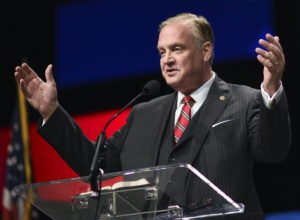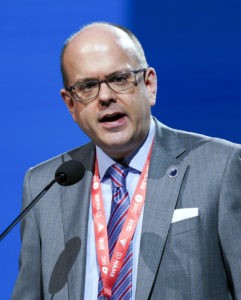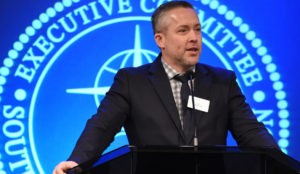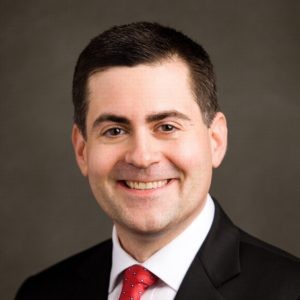Less than a day after the Southern Baptist Convention Executive Committee again declined to follow the explicit request of convention messengers, the resulting governance meltdown spread to the leadership of other agencies who fear they will lose funding from SBC churches angry with the Executive Committee.
The Executive Committee, in addition to serving a coordinating role among all SBC agencies and institutions, is the central processor of gifts to the Cooperative Program unified budget.
Pastors and church leaders are angry because messengers to the SBC annual meeting in June created a Sexual Abuse Task Force to investigate allegations that the Executive Committee and its staff and leaders had covered up or dismissed legitimate cases of sexual abuse within the denomination. Convention messengers also asked the Executive Committee trustees and staff to waive attorney-client privilege so that nothing could be hidden in the final report. That is what the Executive Committee has declined to do.
Here’s a summary of key developments on Wednesday, Sept. 29, after the Executive Committee in a called Zoom session the day before refused for the second time in a week to open itself to full investigation by the Sexual Abuse Task Force:
- All six SBC seminary presidents made public statements calling on the Executive Committee to stop stalling and follow the will of convention messengers — a highly unusual move for the head of any entity to offer public direction to another autonomous entity.
- The Sexual Abuse Task Force issued a no-holds-barred letter that said the “complete impasse” with the Executive Committee remains intractable and reported that Executive Committee attorneys appear to be behind an effort to somehow put the Executive Committee in charge of its own investigation.
- New information has come to light showing that the Executive Committee’s attorneys also are behind the demands that the Executive Committee must control the investigation and that — fully contrary to the will of convention messengers — there should be no public report.
- A group of concerned pastors released a strongly worded letter to the Executive Committee urging compliance with the convention’s instructions. Other pastors and lay leaders have begun announcing their congregations will withhold funding from the SBC or at least the Executive Committee until the investigation happens unimpeded.
- A leader of the ultra-conservative, Calvinist wing of the SBC — a group that has been largely silent in the current debate — tweeted out a letter from a Missouri trustee of the SBC Ethics and Religious Liberty Commission that blames not the Executive Committee or its leadership for covering up sexual abuse but instead blames Russell Moore, who actually had sounded an alarm about the problem before resigning as head of the ERLC.
Response from Sexual Abuse Task Force
The SBC Sexual Abuse Task Force previously created a website to post information about its work. To date, the task force has been transparent about its process and outcomes. On Wednesday, Sept. 29, the group posted a response to the previous day’s Executive Committee decisions.
“To be clear, we strongly believe that the EC should obey the will of the messengers to waive attorney-client privilege. This is the best decision ethically and morally.”
“To be clear, we strongly believe that the EC should obey the will of the messengers to waive attorney-client privilege. This is the best decision ethically and morally,” the report begins.
It is important for observers to understand that the task force and the Executive Committee remain at a “complete impasse,” the letter continues. “It is inaccurate to state that the task force and trustees were very close to an acceptable agreement that meets the will of the messengers.”
Waiving attorney-client privilege for full transparency “is a critical part of the messengers’ motion,” the letter states. “Waiving attorney-client privilege is the only means of ensuring Guidepost (the investigating firm) has both access to and the right to report out any relevant information concerning the EC’s handling of matters related to sexual abuse.”
One of the concerns raised by Executive Committee staff, attorneys and trustees is that waiving privilege could open them individually or corporately to litigation that would not be covered as an insurance claim. The task force acknowledged this reality: “There is no model which waives privilege and 100% protects insurance. For attorneys to represent that this may be able to happen — that it is possible to both follow the express will of the messengers to waive privilege and settle on terms that protect insurance — is not accurate.”
The statement further explains: “Both our attorneys and EC attorneys confirmed that any waiver of privilege at any time does create the risk that in a lawsuit related to a case where privilege is waived, the insurance company could argue that they are discharged from paying the judgment in that case due to waiver.”
“It is impossible to follow the will of the messengers and avoid this risk.”
This is a risk, the task force notes, but says it only matters if “the committee committed significant wrongdoing, was the subject of a lawsuit due to said wrongdoing and had costs or a judgment which needed payment.”
Regardless, the task force asserts, “It is impossible to follow the will of the messengers and avoid this risk.”
One alternative put forward in earlier talks is the so-called “Michigan model,” which would allow the investigators, Guidepost Solutions, to see all documents, including those that might be deemed privileged communication, but would not allow Guidepost to report on that privileged information.
For example, if the investigators found a kind of “smoking gun” document that shows an Executive Committee representative covering up an allegation of sexual abuse, Guidepost would know it existed but could not mention it in the final report.
The Executive Committee, through its Baptist Press news service, indicated Sept. 29 that this model offered a potential compromise that could resolve the ongoing dispute. But the task force said that’s not likely.
“The Michigan model does not waive privilege and does not follow the will of the messengers,” the task force asserts. “This model … is not in accordance with the express directive of the messengers.”
Who contracts with Guidepost?
Another sticking point — not fully understood publicly because it apparently was discussed in executive session — is whether the task force has the authority to contract with Guidepost independent of the Executive Committee. Apparently, in executive session the Executive Committee officers and attorneys have maintained that only they have the authority to contract with an outside firm.
This is relevant because just three days prior to the SBC annual meeting in June, with multiple messengers announcing that they intended to call for an investigation of the Executive Committee, the Executive Committee hired Guidepost to investigate itself. Only in that case, Guidepost would have been accountable exclusively to the Executive Committee, not to the convention, and the Executive Committee could have determined what, if anything, to release publicly.
Statements from the task force indicate that Executive Committee officers, staff and lawyers are trying to wrest back control of the investigation in a way that would allow them potentially to censor or bury its findings.
This arrangement is exactly what convention messengers rebuked at the annual meeting. Messengers took extraordinary measures, overruling the Committee on Order of Business, to name the task force and to place it outside the possible interference of the Executive Committee.
Now, the statements from the task force indicate that Executive Committee officers, staff and lawyers are trying to wrest back control of the investigation in a way that would allow them potentially to censor or bury its findings.
The task force explains this matter in its Sept. 29 letter: “The task force retained our own legal counsel, Linklaters attorneys Adam Lurie and Richard Smith. Both men are former senior Department of Justice officials with extensive background also in corporate law. We asked them to provide an opinion on the legal relationship between the Executive Committee and the Southern Baptist Convention and reach a determination on whether the task force could be the contracting party in this agreement.”
The result, they report, is “a written legal opinion which firmly concluded that the task force, as an agent of the SBC, can adopt the Michigan model and preserve privilege even if the task force is the signatory.”
However, one of the Executive Committee attorneys, Paul Coggins of Dallas, “rejected the offer of speaking with our attorneys in the meeting and also rejected their opinion that the task force could be the contracting party for the investigation,” the statement continues.
Coggins, an attorney with the law firm Locke Lord in Dallas, based his opinion on the judgment of longtime SBC attorney Jim Guenther of Nashville, according to the task force.
“Based on the insistence that the task force could not sign the contract, the (Executive Committee) trustees rejected both the Michigan model and the special master model we had proposed, and instead returned with a contract that made the Executive Committee the contracting party, with the task force receiving ‘updates’ from the EC’s contracted supervising law firm. We believe the trustees did not realize at the time of the offer how different this was from our contract, which had the task force as the contracting party.”
The task force update continues: “We made clear, again, that the task force must be the party hiring and overseeing the investigation and that the Executive Committee could not be in this position due to the direct action of the messengers. We repeated the legal findings that showed we could adopt this model and protect privilege. This model was again rejected, as was the model with a special master. We were informed … that NO model would be acceptable unless the Executive Committee was the contracting party rather than the task force.
The Executive Committee’s attorneys do not intend to allow any agreement in which the Executive Committee itself is not the signing party to the contract, in which the Executive Committee does not control what material is provided and what is released, and in which there is a public report of the findings.
“This rejection and refusal to allow the task force to be the contracting party was again repeated Tuesday morning.”
The bottom line, the task force says, is that the Executive Committee’s attorneys do not intend to allow any agreement in which the Executive Committee itself is not the signing party to the contract, in which the Executive Committee does not control what material is provided and what is released, and in which there is a public report of the findings.
Thus, as of Sept. 29, the task force remains at an impasse with the Executive Committee over two big issues, the update states:
- “We remain firm that waiver of privilege is the clear directive of the messengers and should be followed. Acting in the best interests of the convention entails much more than the issue of insurance, and we believe it is clear that the best interests of the convention are to act with transparency and accountability and truth, and to follow the express directive of the messengers.’
- “We remain firm that in any contract, the task force must be the contracting party.”
Seminary presidents weigh in
Within the SBC, the Executive Committee is one of 11 entities that are governed by trustees elected by the convention in annual session. Six of those 11 are seminaries. Because of the concept of Baptist autonomy, it is exceedingly rare for the head of one SBC entity to offer public instruction to trustees of another entity.
That taboo ended Sept. 28 after the Executive Committee still refused to fulfill the expressed will of convention messengers. Within less than 24 hours, all six seminary presidents issued statements calling on the Executive Committee to do what convention messengers required.

Al Mohler speaks to messengers at the 2021 SBC annual meeting in Nashville. (Baptist Press)
Al Mohler, president of Southern Baptist Theological Seminary in Kentucky, wrote: “Clearly, the SBC now confronts issues that reach far beyond the decisions of just one SBC entity. … The convention spoke clearly its insistence that the task force and its third-party investigation agency have full and unimpeded access to all materials needed for that investigation. The will of the SBC must be fully respected and enacted.”
And in a direct rebuttal to the position of the Executive Committee’s attorneys, he added: “No SBC entity should play any role in editing or redacting that report.”
To Executive Committee trustees, he advised: “The only real decision is how to comply fully with the mandate of the messengers, not whether. And this is not just a matter of sentiment it must be a matter of action, and time has run out.”
Jeff Iorg, president of Gateway Seminary in California, said two things are now clear. “First, the messengers intended a full investigation of the EC on these matters. Second, trust is eroding every day that investigation is hindered. Despite the significant legal issues being debated, the EC must find a way to fulfill the directive of the convention — without further delay.”

Adam Greenway (Baptist Press)
Adam Greenway, president of Southwestern Baptist Theological Seminary in Texas, tweeted a long string of comments, beginning with an explanation about why he had refrained from speaking until now. “But after today’s special @SBCExecComm meeting, I am seeing increasing calls for @SBCCP defunding, and that both grieves and alarms me b/c of unintended consequences. I certainly understand the frustration of the #SBC21 messengers’ will being repeatedly delayed or disregarded.”
And in a direct reference to the Executive Committee’s own leadership, Greenway wrote that the Tuesday, Sept. 21, meeting “was a colossal failure of leadership, plain and simple.”
Jamie Dew, president of New Orleans Baptist Theological Seminary, tweeted: “This has devolved into a full-blown crisis and I urge the @SBCExecComm to follow the clear directive of the messengers of the #SBC21.”
Other reaction
Meanwhile, social media was ablaze with comments and questions and information sharing by SBC pastors and leaders — most of it angry and expressing astonishment at the inaction by the Executive Committee, which is largely perceived as blocking the investigation.
Todd Benkert, an Indiana pastor and ERLC trustee, tweeted: “If the @SBCExecComm cannot even agree to a special master process then what they are saying is NOT that they have fiduciary concerns, but that they are unwilling to allow themselves to be investigated without being able to control the outcome of the investigation.”
Bart Barber, a Texas pastor and parliamentarian, tweeted: “When it would have broken our polity to prevent slaveholders from being missionaries, we insisted upon the rights of the churches. When it would have broken our polity to support Southern Baptists in favor of integration and oppose Southern Baptists in favor of segregation, we insisted upon the rights of the churches. When it would have greatly hastened our battle for biblical inerrancy, we followed our polity and worked through the will of the messengers. And when it was a reason to do less in defense of the abused, we stuck to our polity, which the @SBCExecComm articulated more than once. I would rise to the defense of our polity in any situation, but it will be a lasting disgrace, a stain that will not be erased in generations, that, having refused to violate our polity to do good things, we finally trampled it underfoot to facilitate a coverup of wickedness.”

J.D. Greear (Photo: Baptist Press)
J.D. Greear, a North Carolina pastor and immediate past SBC president, tweeted: “Confused and disappointed by reports out of the @sbcexeccomm meeting tonight. Let me be clear … From where I stood when the vote was taken, the will of the messengers was clear — They wanted a fully independent, fully transparent investigation. The Executive Committee should be discussing how they can best fulfill the messengers’ wishes, not if they will. Furthermore, survivors deserve a clear and honest account.”
A group of 16 pastors, including Benkert and Barber, released a joint letter on the website SBC Voices urging the Executive Committee to reverse course. The letter concludes: “We pray that you will do the will of the messengers as expressed in the adopted motion, but more importantly we pray that you will defend these survivors who desire justice. Your failure to do so will not only endanger our polity; it also brings significant harm and revictimization to those who have already suffered so much. Please, do the right thing.”
Or is Russell Moore to blame?
On the other hand, Tom Ascol, leader of a group of Calvinist Southern Baptists who believe the SBC has fallen once again into liberalism, tweeted out a lengthy letter written by a Missouri attorney who claims the real culprit in all this is Russell Moore, former head of the SBC’s Ethics and Religious Liberty Commission.
That 12-page letter was written by Jonathan Whitehead, a layperson who serves on the board of the ERLC. It was written Sept. 17 to the Sexual Abuse Task Force.

Russell Moore
Part of what sparked the creation of the task force was statements by Moore, who as head of the ethics agency had been an outspoken advocate supporting sexual abuse survivors. It was an ERLC conference focused on the problem of sexual abuse that reportedly angered leaders of the Executive Committee.
In June, days before the SBC annual meeting and after Moore had announced his resignation to join the staff of Christianity Today, two letters were leaked that documented his concerns about the sexual abuse problem and the Executive Committee leadership. Also, audio recordings of Executive Committee members were released in which they can be heard making light of sexual abuse survivors’ stories.
In a new twist on the SBC drama currently playing out, Whitehead claims the task force should investigate the ERLC and Moore for withholding information for a year.
The leaks of these letters were intended only to harm the SBC and to create a polity crisis, he contends: “The point was to shock and dismay SBC messengers before an annual meeting, to produce political ends.”
Whitehead and his father, Michael Whitehead, have been key figures in two decades of litigation between the Missouri Baptist Convention and several agencies that tried to break free of its grip as the state convention became more rigid in its fundamentalism. Michael Whitehead served as staff legal counsel for the ERLC in the early 1990s, before Moore became executive director.
Related articles:
SBC faces a test of its governance with tug-of-war over sexual abuse investigation | Analysis by Mark Wingfield
SBC Executive Committee hires a firm to investigate itself and report findings to itself


